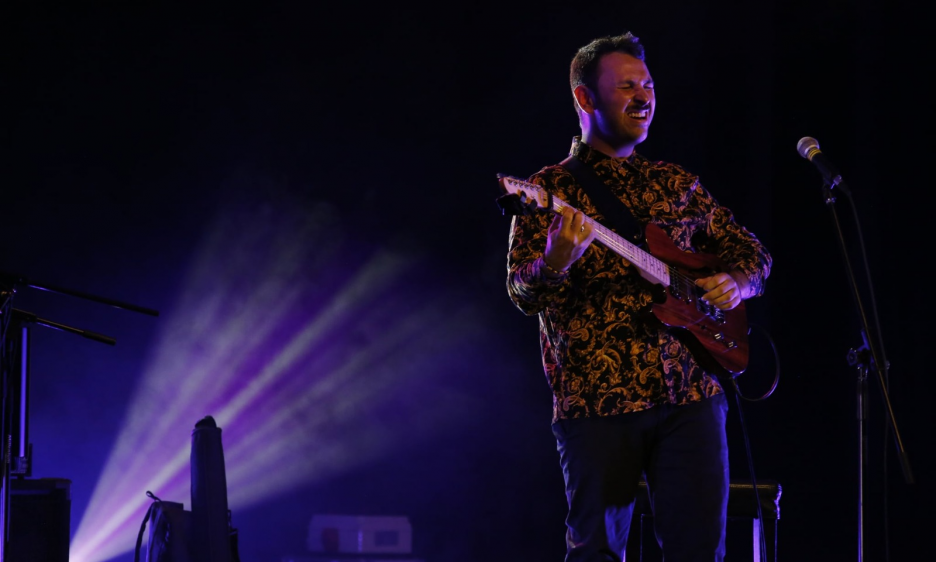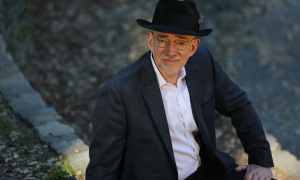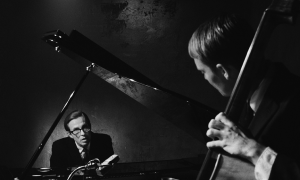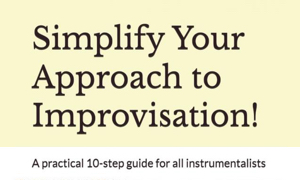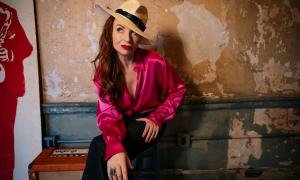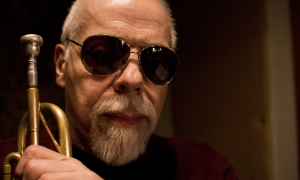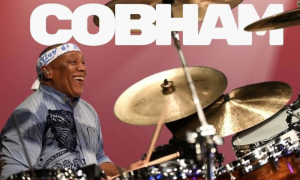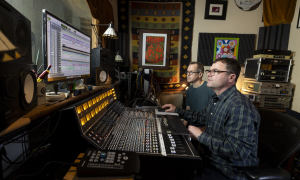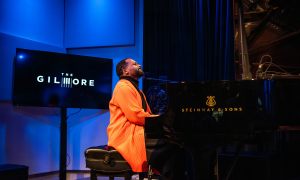A trailblazer in the new generation of Brazilian jazz, Augusto Baschera is redefining the traditional role of instruments in composition with his fresh and innovative approach.
Augusto Baschera is an important musician of the new generation of Brazilian jazz, who presents an innovative approach in the relationship between instrument and composition. He was born in the interior of Rio Grande do Sul, in the city of Ibiaçá, a place with less than 5,000 inhabitants.
Growing up in a musical environment, with a father who was a musician and an older brother who was already on this path, he became active in the internationalization of his music and the music of his people from a young age, performing at folk festivals in countries such as Argentina, Mexico, and Uruguay. Currently, he lives between Brazil and Europe.
Augusto was self-taught until the age of 14 and then began studying musical formation, harmony, improvisation, and classical guitar with Professor Roberto Thiessen. Later, he enrolled at the University of Passo Fundo, where he completed a Bachelor's degree in Classical Guitar with top marks.
Alongside classical music, he continued to be involved in popular and improvised music, where he was awarded prizes in festivals as an instrumentalist, arranger, and composer. In 2014, he moved to Portugal, where he completed a Master's degree in Performance—Guitar, at the Superior School of Music of Lisbon/Portugal. In 2016, he was a guest soloist for the ESML Symphony Orchestra.
Q: What inspired you to transition from classical music, which is your primary formation, to jazz?
A: Improvisation was always present in the musical environments I frequented, whether at home or in my father's work as a musician. It was inevitable not to think about the momentary creation, especially when it came to music for dance and entertainment. Initially, jazz presented itself unconsciously, without stereotypes, language, aesthetics, or a specific approach. The mixture of classical music, jazz, and folk music happened daily. My brother had classical accordion and jazz piano lessons, and I would listen to an accordion piece as well as a theme and solo by Michel Petrucciani. At the end of the day, I would watch my father's regional music group's entire rehearsal, always walking among the musicians and observing everything. I particularly enjoyed the moment when the musicians opened their instrument cases (laughs).
Q: What is your creative process, and how do you describe the aesthetic transition in the trajectory of your albums?
A: Usually, I am always looking for the new, and that ends up taking me somewhere or something I want to talk about. Artistically, what bothers me the most is being stagnant, playing the same things, or thinking in the same way about some subjects already visited. Regarding composing a song or an album, I always have a filled imagination with ideas even before starting the process. It's as if I had to make a drawing, and I already knew which landscape I wanted. Then, it's a matter of finding the right colors and techniques for each type of expression. Hence, I believe in the importance of always studying and updating oneself, and seeking new knowledge, whether in improvised music, classical music, or folk music, among other arts that can inspire us.
But there is no rule. There is a specific case about the compositional process that is my duo in partnership with the Azorean pianist João Bernardo, with whom I released my latest work. In this album, Tempos e Lugares, the compositions are all made jointly and simultaneously. No one composes anything in the absence of the other, so the composition naturally progresses through the choices of the two at the time of creation. This only works because we already know very well how our duo works and where we want to project our music.
Regarding the aesthetic transition, I think it's a consequence of this restlessness and the search for a place I haven't yet discovered. It's a parallel with personal evolution. We are always trying to improve and discover new aspects.
Q: One of the most significant transitions between albums is instrumentation. How did you start using the electric guitar in your music?
A: Since childhood, the guitar was my primary instrument, but the electric guitar has also always been present. The issue of the guitar appearing later was due to a natural need that my music demanded. In some things in my imagination, the guitar was necessary because of idiomatic issues of the instrument and basic acoustic and physical principles, such as note duration, frequencies, and especially sustain. The guitar ends up piercing more frequencies in a larger formation with drums, bass, keyboards, and winds. I choose the guitar for intimate music or with a more percussive character, as it is an extremely rich instrument in this regard.
Q: How do you feel about the acceptance of your music in the European market?
A: I always feel a good acceptance from the audience that is connected to this type of music, usually they are as interested as we artists in discovering the new and the unknown, two elements that are always present when it comes to artistic expectations in European culture. Every artist has to contribute to their audience, and must always be willing to take the paths that lead us to this contribution. In my case, I am fortunate to be Brazilian, and our Brazilian culture brings a great musical richness, full of possibilities to explore. This brings great responsibility, and consequently, it is always surprising on the positive side, the possibility of getting to know different cultures and traditions within my own country is fuel for the endless next steps.
Q: Which current musicians inspire you?
A: It is inevitable not to feel the importance of the tradition of classical music, since the Baroque era. It is impossible to talk about music in the West without mentioning Bach, for example, and what his music represented for the development of this art and the future modifications and blends that could happen later on. There are countless musicians nowadays who inspire me, each in their own way. I usually choose people who inspire me to work with and have them around in one project or another, as it is a chance to learn about something I like. And every day I discover new people who can inspire me. The exchange of knowledge is inevitable for creation, and I also attach great importance to self-knowledge, as a source of inspiration for art and for life. This is an infinite source of inspiration.
Q: To wrap up, What are your next steps in music?
A: There's still a lot I want to achieve, and my next steps will be focused on writing my own music and developing that further. I've already been involved in the symphonic world as a soloist, and in the near future, I hope to write something of my own for this format and record it. My next albums are related more to jazz. I have a record that's already in progress, and I've invited Brazilian musician Frederico Heliodoro to collaborate and co-produce. This album is a blend of modern Brazilian music with strong jazz influences, featuring collaborations between musicians from Brazil and Portugal. There's another project in progress called Travessia, which focuses on Azorean music and reinterpretations of traditional Azorean music that arrived in Brazil, specifically in the southern part of the country. It develops new compositions and arrangements with a strong emphasis on contemporary improvised music, a very modern language. This project is currently on tour in Europe in 2023.
Growing up in a musical environment, with a father who was a musician and an older brother who was already on this path, he became active in the internationalization of his music and the music of his people from a young age, performing at folk festivals in countries such as Argentina, Mexico, and Uruguay. Currently, he lives between Brazil and Europe.
Augusto was self-taught until the age of 14 and then began studying musical formation, harmony, improvisation, and classical guitar with Professor Roberto Thiessen. Later, he enrolled at the University of Passo Fundo, where he completed a Bachelor's degree in Classical Guitar with top marks.
Alongside classical music, he continued to be involved in popular and improvised music, where he was awarded prizes in festivals as an instrumentalist, arranger, and composer. In 2014, he moved to Portugal, where he completed a Master's degree in Performance—Guitar, at the Superior School of Music of Lisbon/Portugal. In 2016, he was a guest soloist for the ESML Symphony Orchestra.
Q: What inspired you to transition from classical music, which is your primary formation, to jazz?
A: Improvisation was always present in the musical environments I frequented, whether at home or in my father's work as a musician. It was inevitable not to think about the momentary creation, especially when it came to music for dance and entertainment. Initially, jazz presented itself unconsciously, without stereotypes, language, aesthetics, or a specific approach. The mixture of classical music, jazz, and folk music happened daily. My brother had classical accordion and jazz piano lessons, and I would listen to an accordion piece as well as a theme and solo by Michel Petrucciani. At the end of the day, I would watch my father's regional music group's entire rehearsal, always walking among the musicians and observing everything. I particularly enjoyed the moment when the musicians opened their instrument cases (laughs).
Q: What is your creative process, and how do you describe the aesthetic transition in the trajectory of your albums?
A: Usually, I am always looking for the new, and that ends up taking me somewhere or something I want to talk about. Artistically, what bothers me the most is being stagnant, playing the same things, or thinking in the same way about some subjects already visited. Regarding composing a song or an album, I always have a filled imagination with ideas even before starting the process. It's as if I had to make a drawing, and I already knew which landscape I wanted. Then, it's a matter of finding the right colors and techniques for each type of expression. Hence, I believe in the importance of always studying and updating oneself, and seeking new knowledge, whether in improvised music, classical music, or folk music, among other arts that can inspire us.
But there is no rule. There is a specific case about the compositional process that is my duo in partnership with the Azorean pianist João Bernardo, with whom I released my latest work. In this album, Tempos e Lugares, the compositions are all made jointly and simultaneously. No one composes anything in the absence of the other, so the composition naturally progresses through the choices of the two at the time of creation. This only works because we already know very well how our duo works and where we want to project our music.
Regarding the aesthetic transition, I think it's a consequence of this restlessness and the search for a place I haven't yet discovered. It's a parallel with personal evolution. We are always trying to improve and discover new aspects.
Q: One of the most significant transitions between albums is instrumentation. How did you start using the electric guitar in your music?
A: Since childhood, the guitar was my primary instrument, but the electric guitar has also always been present. The issue of the guitar appearing later was due to a natural need that my music demanded. In some things in my imagination, the guitar was necessary because of idiomatic issues of the instrument and basic acoustic and physical principles, such as note duration, frequencies, and especially sustain. The guitar ends up piercing more frequencies in a larger formation with drums, bass, keyboards, and winds. I choose the guitar for intimate music or with a more percussive character, as it is an extremely rich instrument in this regard.
Q: How do you feel about the acceptance of your music in the European market?
A: I always feel a good acceptance from the audience that is connected to this type of music, usually they are as interested as we artists in discovering the new and the unknown, two elements that are always present when it comes to artistic expectations in European culture. Every artist has to contribute to their audience, and must always be willing to take the paths that lead us to this contribution. In my case, I am fortunate to be Brazilian, and our Brazilian culture brings a great musical richness, full of possibilities to explore. This brings great responsibility, and consequently, it is always surprising on the positive side, the possibility of getting to know different cultures and traditions within my own country is fuel for the endless next steps.
Q: Which current musicians inspire you?
A: It is inevitable not to feel the importance of the tradition of classical music, since the Baroque era. It is impossible to talk about music in the West without mentioning Bach, for example, and what his music represented for the development of this art and the future modifications and blends that could happen later on. There are countless musicians nowadays who inspire me, each in their own way. I usually choose people who inspire me to work with and have them around in one project or another, as it is a chance to learn about something I like. And every day I discover new people who can inspire me. The exchange of knowledge is inevitable for creation, and I also attach great importance to self-knowledge, as a source of inspiration for art and for life. This is an infinite source of inspiration.
Q: To wrap up, What are your next steps in music?
A: There's still a lot I want to achieve, and my next steps will be focused on writing my own music and developing that further. I've already been involved in the symphonic world as a soloist, and in the near future, I hope to write something of my own for this format and record it. My next albums are related more to jazz. I have a record that's already in progress, and I've invited Brazilian musician Frederico Heliodoro to collaborate and co-produce. This album is a blend of modern Brazilian music with strong jazz influences, featuring collaborations between musicians from Brazil and Portugal. There's another project in progress called Travessia, which focuses on Azorean music and reinterpretations of traditional Azorean music that arrived in Brazil, specifically in the southern part of the country. It develops new compositions and arrangements with a strong emphasis on contemporary improvised music, a very modern language. This project is currently on tour in Europe in 2023.

